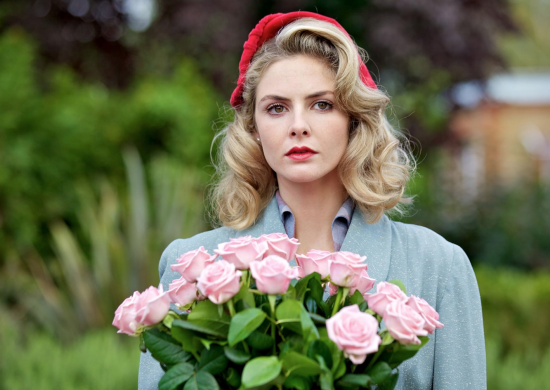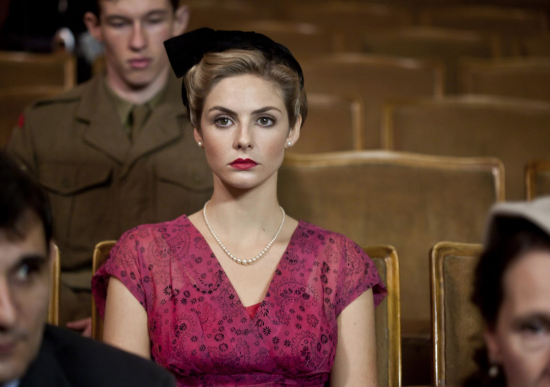Above and Beyond
John Boorman Follows up His Masterpiece
 There aren’t too many 81-year-old directors still making movies. There are even fewer of John Boorman’s magnitude contributing such nuanced delights as “Queen and Country.” As evidenced here, the director behind such cinematic gems as “Point Blank” (1967), “Deliverance” (1972), and “The General” (1998) still has something to offer contemporary audiences.
There aren’t too many 81-year-old directors still making movies. There are even fewer of John Boorman’s magnitude contributing such nuanced delights as “Queen and Country.” As evidenced here, the director behind such cinematic gems as “Point Blank” (1967), “Deliverance” (1972), and “The General” (1998) still has something to offer contemporary audiences.
This sequel to Boorman’s career-defining autobiographical World War II era masterwork “Hope and Glory” (about his childhood growing up in bombed out London) is a nostalgic but frank retelling of his life during two years of conscripted service in the British Army after the war’s end.
The genial yet irreverent tone that Boorman sustains throughout “Queen and Country” softens the freely expressed [frequently opposing] political and social views that swirl between the picture’s alternately familial and military base settings.
The romanticized narrative picks up where “Hope and Glory” left off. The year is 1952. John Boorman’s now-18-year-old alter ego Bill Rohan (played by the charismatic Callum Turner) hopes that his family’s isolated household on Pharaoh’s Island, River Thames, might prevent the Army from finding him. The family doesn’t even have a phone. His home’s remote location sits adjacent to the now-famous Shepperton film studios. Inspiration lurks. Bill witnesses motion pictures being made in his own backyard, or dockside river as it were. Throughout the film’s naturalistic dialogue, Boorman drops a stream of references to the films of his youth, such as Kurosawa’s “Rashomon,” to provide a chorus of historic reference points to his early muses. If you’re a film lover, you can’t help but be charmed.
The likely lad gets a break when he avoids being shipped off to Korea after being assigned to train new recruits to type and read maps in the company of Percy Hapgood, his new best friend and fellow soldier. Percy (Caleb Landry Jones) is an inveterate prankster and womanizer who takes more umbrage than Bill at their constant abuse under Sgt. Major Bradley (David Thewlis), a humorless stickler for the Army rulebook. Percy’s exaggerated desire to kill Bradley, or at least cause him to self-destruct, veers into extended flights from sanity. Stealing an illustrious Company clock to get Bradley’s goat escalates into much more than a dirty little prank.
Brilliant set piece sequences where Sgt. Major Bradley brings his snotty subordinates up for reprimand before Richard E. Grant’s alcohol-fueled Major Cross, create divine moments of hilarity. You can see the tremendous fun these two towering British actors share riffing off one another. You’ll wish every British movie featured Richard E. Grant and David Thewlis playing scenes together.
Percy may be more daring and experienced with women, but Bill is easily excited into bold action when the situation calls for it. A chance meeting between Bill and an elusive blonde (Tasmin Egerton), whom Bill dubs “Ophelia,” sets off a romantic journey. Sparks fly when Bill’s sister Dawn (Vanessa Kirby) exhibits more than average sibling affection for her brother during a family visit that Ophelia attends.
Boorman doesn’t overstate the relationship, but it seems on face value that his sister was more than a little sweet on him in their youth. Boorman’s unfussy approach to his youthful past creates a warm sense of familiarity with the characters he presents, however quirky their motivations may be.
It is a tidy slice-of-life movie about a bygone era of pomp and circumstance where boys could grow into idealistic men even if after being court-marshaled for “seducing a soldier from his duties,” as Bill is before his time in the Army is complete. Women don’t get as much latitude. Bill still harbors resentments toward his mother (Sinead Cusack) for an affair she had with a neighbor with whom she waves at from across the river every day. Bill, it seems, still has some growing up to do.
Not Rated. 105 mins.







